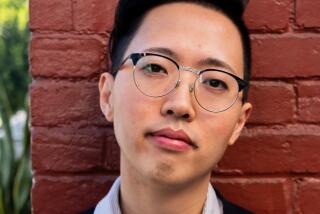Living’s a dirty business
HALFWAY through poet Kim Addonizio’s debut novel, “Little Beauties,” her main character, Diana McBride, makes a drunken confession to a man she’s just met: “I wash.” Diana washes obsessively, the kind of washing that leaves her palms red and peeling, and that calls for rinsing and repeating while her marriage collapses on the other side of the bathroom door. A former beauty pageant winner, she now settles for employee of the month at Teddy’s World, a Long Beach baby-goods store. Her husband of 12 years is gone, worn out by the numerous rules his wife had posted in their apartment (e.g., “Wash any bedding that touches the floor”), by having to shower twice before bed and by Diane’s unflagging ability to transform any new job or dwelling from a place of hope to a source of disgust and contagion.
Shed skin cells, hair and nail clippings, excrement, bacteria: These are the central players in Diana’s psychodrama. “Molecules get exchanged all the time,” she says, “a continual, messy, back-and-forth commerce between you and the rest of the world. Try not to think about it too much.” Her soothing retail persona coos over sour-smelling babies while, inwardly, she retches and plots her escape to the sink. This recurring and all-too-realistic antiphon of dread saves “Little Beauties” from a cuteness of eccentricity and gives weight to the moments when Diana reveals herself to others.
She finds an unlikely ally in Jamie Ramirez, a pregnant 17-year-old who comes to Teddy’s World to buy a musical bear for the baby she’s giving up for adoption. She returns with the infant girl a few weeks later, trying on motherhood after all and needing a place to stay. She and Diana are both beautiful women whose looks have done them no service. “I hate people,” Diana tells her. “So do I,” answers Jamie, sealing the friendship.
Former U.S. poet laureate Billy Collins has described Addonizio’s poems as “intensified versions of the barroom ballad.” Some parts of “Little Beauties” read like transpositions of these songs of loss and longing into novel form. Multiple viewpoints -- Diana’s, Jamie’s, the baby Stella’s -- and short chapters allow for brief, intense movement, a single lament or insight, rather than sustained development. This quick weaving between characters and scenes is cleverly done but can also blunt some of the novel’s emotional effects. Addonizio’s language is accessible but pleasingly unexpected: “She refused to study for this baby,” Jamie realizes. “Now it is here, a week early, like a pop quiz.” The biggest risk she takes is in the spiritual element of her plot. Some of Stella’s chapters occur before her birth, in a place she describes as “the blueness,” and we are later encouraged to regard Stella as the reincarnation of a recently dead character.
Some readers will abandon “Little Beauties” when the reincarnation theme surfaces. Diana and Jamie probably would too. This part of the narrative goes soggy, rather than deepening in emotion. But like Anne Lamott -- whose novels have much in common with “Little Beauties” -- Addonizio seems to sense how to pull back from sentimentality, be it with humor, honesty or clarity of vision. Some details are beautifully related: Jamie delivers her baby in the front seat of a stranger’s Mercedes, into the hands of cops who “look like kids at Christmas.”
The bitterness of Jamie’s voice -- an adolescent version of the world-weary Diana’s -- is a tonic throughout. When her water breaks, she limps around Long Beach looking for a gas station restroom: “There is never a bathroom when you need one. The world was designed for men, so they could spend their time drinking beer and high-fiving and punching each other in the stomach instead of doing the dirty work of life, like having babies.”
The mysteries of birth and death come in for some ballyhoo in “Little Beauties,” while sex, drugs and alcohol are treated matter-of-factly, like a romance that has evolved into a wary friendship. Similarly, by the novel’s end, Addonizio has given her characters some enticing possibilities, but she shies from easy answers. Diana wants to blame her controlling mother for her obsessive-compulsive disorder, for example, but realizes “it’s pretty much a biological thing.... I could have had the sweetest mother in the world, and still I’d hear a bar of soap calling my name.” Self-knowledge may be one of the little beauties of life, but so is moving forward despite it.
More to Read
Sign up for our Book Club newsletter
Get the latest news, events and more from the Los Angeles Times Book Club, and help us get L.A. reading and talking.
You may occasionally receive promotional content from the Los Angeles Times.






